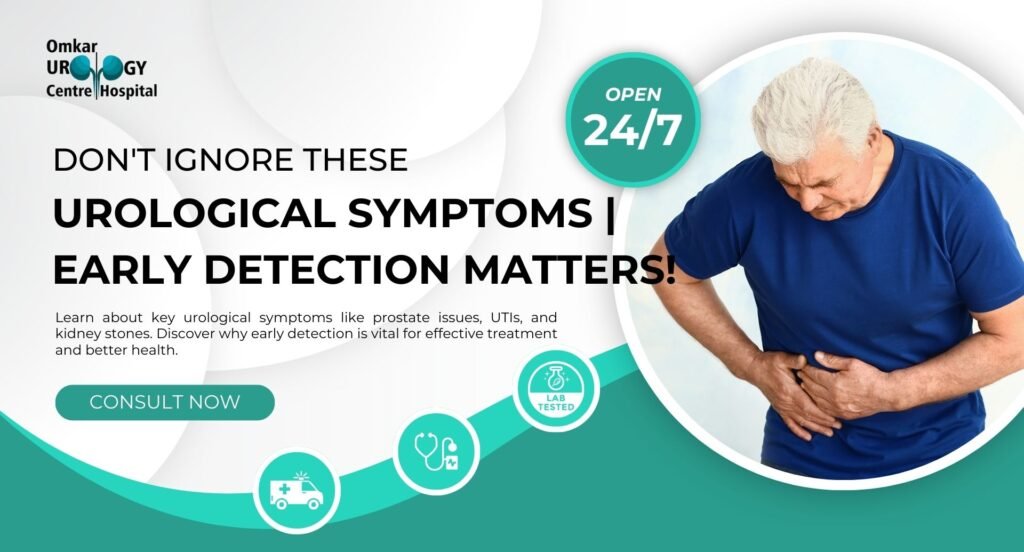Urinary Tract Infections (UTIs) are one of the most common urological conditions affecting millions of people worldwide. While they are more prevalent in women, men and children can also experience UTIs. If left untreated, UTIs can lead to severe complications such as kidney infections and long-term urinary issues. Fortunately, most UTIs can be prevented or treated effectively with proper care and medical attention.
In this blog, we will explore what UTIs are, their causes, symptoms, prevention strategies, and available treatment options. We will also provide insights into how Omkar Urology Hospital, the best urology hospital in Varanasi, offers specialized care for patients dealing with UTIs.
Understanding Urinary Tract Infections (UTIs)
A urinary tract infection occurs when harmful bacteria, most commonly Escherichia coli (E. coli), enter the urinary tract and multiply, causing infection. The urinary tract consists of the kidneys, ureters, bladder, and urethra. UTIs can affect any part of the urinary tract, but most infections occur in the lower urinary tract, which includes the bladder and urethra.
UTIs are typically categorized into two types:
- Lower Urinary Tract Infections: Infections that affect the bladder (cystitis) or urethra (urethritis). These are the most common types of UTIs.
- Upper Urinary Tract Infections: Infections that affect the kidneys (pyelonephritis) or ureters. These infections are more serious and can cause long-term health issues if not treated promptly.
Causes of Urinary Tract Infections
Several factors can lead to UTIs, with the most common cause being the entry of bacteria into the urinary tract through the urethra. Some of the common causes include:
- Poor Hygiene: Improper wiping or cleaning practices can cause bacteria to spread from the rectum to the urethra, leading to infection.
- Sexual Activity: Sexual intercourse can introduce bacteria into the urinary tract, increasing the risk of developing a UTI.
- Urinary Retention: Holding urine for too long can create an environment where bacteria multiply, leading to infection.
- Blockages: Kidney stones, an enlarged prostate, or other conditions that block urine flow can lead to bacterial growth and UTIs.
- Weakened Immune System: People with weakened immune systems, including those with diabetes or certain autoimmune conditions, are at a higher risk of developing UTIs.
- Catheter Use: Patients who use urinary catheters are at an increased risk of UTIs because catheters can introduce bacteria into the urinary tract.
READ MORE: Kidney Stones: Causes, Symptoms, and Preventive Measures for a Healthy Life
Symptoms of UTIs
UTIs can cause a variety of uncomfortable symptoms, and early detection is essential for effective treatment. Common symptoms include:
- A strong, persistent urge to urinate
- A burning sensation during urination
- Passing frequent, small amounts of urine
- Cloudy or foul-smelling urine
- Blood in the urine (hematuria)
- Pelvic pain (common in women)
For upper urinary tract infections, symptoms may be more severe and include:
- Fever and chills
- Nausea or vomiting
- Pain in the back or sides
- Fatigue
If you experience any of these symptoms, it is essential to seek medical attention to prevent the infection from worsening.
Preventing Urinary Tract Infections
While some factors that contribute to UTIs, such as anatomy and medical conditions, are beyond our control, many preventive measures can reduce the risk of developing an infection. Here are some tips for preventing UTIs:
1. Practice Good Hygiene
Proper personal hygiene can help reduce the risk of bacteria entering the urinary tract. For women, it’s essential to wipe from front to back after using the bathroom to prevent bacteria from spreading to the urethra.
2. Stay Hydrated
Drinking plenty of water helps flush out bacteria from the urinary tract and reduces the chances of infection. Aim for at least 8 glasses of water a day.
3. Urinate After Sexual Activity
Urinating after sexual intercourse helps flush bacteria out of the urethra before they can cause an infection. This is particularly important for women, who are more prone to post-coital UTIs.
4. Avoid Holding in Urine
Holding in urine for extended periods can allow bacteria to grow in the bladder, increasing the risk of infection. Make it a habit to urinate frequently and completely empty your bladder.
5. Wear Breathable Clothing
Wearing cotton underwear and loose-fitting clothing can help keep the genital area dry, reducing the risk of bacterial growth. Avoid tight clothing and synthetic fabrics that can trap moisture.
6. Avoid Harsh Products
Using harsh soaps, feminine sprays, or douches can irritate the urethra and increase the risk of infection. Stick to mild, unscented products for personal care.
7. Consider Probiotics
Probiotics, especially those containing Lactobacillus, can help maintain healthy bacterial balance in the urinary and digestive tracts, reducing the risk of UTIs.
READ MORE: The Importance of Early Detection: Key Urological Symptoms You Shouldn’t Ignore
Treatment Options for UTIs
Most UTIs are treated with a course of antibiotics prescribed by a doctor. It’s important to complete the full course of antibiotics, even if symptoms improve, to ensure the infection is entirely cleared. Here’s a closer look at the treatment options for UTIs:
1. Antibiotics
The first-line treatment for UTIs is antibiotics, which kill the bacteria causing the infection. Depending on the severity of the infection and the patient’s medical history, different types of antibiotics may be prescribed. Common antibiotics for UTIs include amoxicillin, ciprofloxacin, and nitrofurantoin.
2. Pain Relief
Over-the-counter pain relievers, such as ibuprofen or acetaminophen, can help manage discomfort and reduce fever in patients with UTIs. In some cases, doctors may also prescribe medication to relieve bladder pain.
3. Increased Fluid Intake
Drinking plenty of water is crucial during a UTI, as it helps flush bacteria from the urinary system. Cranberry juice has also been suggested to prevent or treat UTIs, but its effectiveness remains debated among experts.
4. Severe Infections
For upper urinary tract infections or complicated UTIs, hospitalization may be necessary. Intravenous (IV) antibiotics and fluids may be required to treat severe infections, especially in cases of kidney infection.
5. Surgical Intervention
If a UTI is caused by a structural abnormality in the urinary tract, such as kidney stones or an obstruction, surgery may be needed to correct the issue and prevent future infections.
When to See a Urologist
If you experience frequent or recurrent UTIs, it may be time to consult a urologist. Chronic UTIs can indicate an underlying issue that requires specialized treatment. A urologist can perform diagnostic tests, such as urine cultures or imaging studies, to determine the cause of recurrent infections and recommend appropriate treatments.
READ MORE: How to Choose the Right Urology Doctor in Varanasi for Your Condition?
Omkar Urology Hospital: Best Urology Hospital in Varanasi
At Omkar Urology Hospital, we understand the discomfort and complications associated with urinary tract infections. As the best urology hospital in Varanasi, our expert team of urologists provides comprehensive care for UTIs and other urological conditions. We use advanced diagnostic techniques to identify the root cause of infections and offer personalized treatment plans to help patients recover quickly and prevent future UTIs.
Whether you need treatment for a simple UTI or a more complex urological issue, Omkar Urology Hospital is dedicated to providing exceptional care and ensuring your urinary health is in the best hands. Contact us today to schedule an appointment with one of our experienced urologists.








